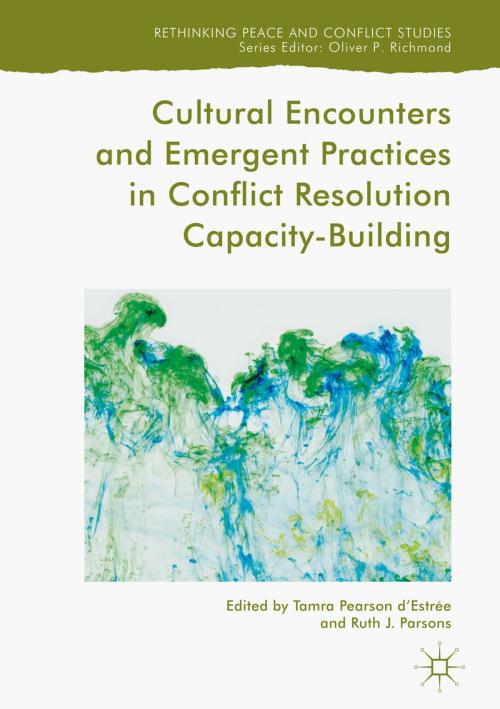Cultural Encounters and Emergent Practices in Conflict Resolution Capacity-Building
Nonfiction, Social & Cultural Studies, Political Science, International, International Security, Reference & Language, Reference| Author: | ISBN: | 9783319711027 | |
| Publisher: | Springer International Publishing | Publication: | May 31, 2018 |
| Imprint: | Palgrave Macmillan | Language: | English |
| Author: | |
| ISBN: | 9783319711027 |
| Publisher: | Springer International Publishing |
| Publication: | May 31, 2018 |
| Imprint: | Palgrave Macmillan |
| Language: | English |
“Undoubtedly the most comprehensive analysis of the role of culture and emergent practices in capacity building currently at hand. d’Estrée and Parsons have produced a commendable amalgamation and scrutiny of local, cultural, and Indigenous mediation practices in a number of contexts that empower local people while interacting and integrating with Western mediation models in a blend of hybridity. The book is beautifully structured and will attract a wide readership including graduate and undergraduate students.”
—Sean Byrne, Director, Arthur V. Mauro Centre for Peace & Justice, and Professor, Peace & Conflict Studies, University of Manitoba, Canada
“Since late 1990s conflict resolution field has recognized the need to integrate culture in its processes. This book goes beyond such theoretical recognition and provides empirical evidence and solid concrete cases on how local actors from a wide range of cultural contexts integrated their cultural analysis and tools in their own sustainable conflict resolution processes. It also offers an effective set of guidelines and lessons learned for policy makers and peacebuilding practitioners on the need to deepen their reliance on local cultural practices of peace.”
—Mohammed Abu-Nimer, Professor of International Peace and Conflict Resolution, School of International Service, American University, and Founder and Director of the Salam: Peacebuilding and Justice Institute in Washington, DC, USA
“The evolving identities of communities impacted by deep historical divisions and population migration, in the context of life threatening resource shortages, present opportunities and challenges for conflict transformation professionals at every level. d'Estrée and Parsons respond to this challenge with a remarkable collection of stories from around the world that amplify the innovation in the field while capturing its history and complexity. It serves as the bridge between mediation and peacebuilding that is so necessary today.”
—Prabha Sankaranarayan, CEO, Mediators Beyond Borders International
“In this excellent book, Tamra Pearson d’Estrée and Ruth Parsons (and their impressive collection of case study authors) have analysed four generations of conflict resolution/transformation theory and practice. They highlight the diverse ways in which the burgeoning field of conflict resolution theorists and practitioners mirrored the ascendance and now decline of the neo-liberal western project. First and second generation efforts were based on notions of possessive individualism, rational choice theory and a general acceptance of the status quo. Culture was ignored or eliminated as were deeper questions of political and social inequality. But more importantly, there was an unwillingness to consider the power and the wisdom that resided in locality. Third and fourth generation conflict transformers, on the other hand, have engaged these deeper questions and focused more attention on emancipatory creative partnerships, social and economic justice, co-learning and hybridised models flowing from external engagement with local wisdom. This is a book that needs to be read by anyone interested in the transformative power of conflict resolution and long term social and political change.”
—Kevin P Clements, Professor, Chair and Foundation Director, The National Centre for Peace and Conflict Studies, University of Otago, New Zealand
While waves of scholarship have focused either on the value of presumed universal models or of traditional practices of conflict resolution, curiously missing has been the recognition and analysis of the actual intermingling and interacting of western and local cultural practices that have produced new and emergent practices in our global community. In this compilation of case studies, the authors describe partnerships forged between local practice expertise and bearers of “western/institutional” models to build innovative approaches to mediation and conflict resolution. Including stories of these experiences and the resulting hybrid models that emerged, the book explores central questions of cultural variation and integration, such as the perception of purpose and function of resolution processes, attitudes toward conflict, arenas and timeframes, third party roles, barriers to process use, as well as how to remain true to culture and context. It also examines partnership dynamics and lessons learned for modern cross-cultural collaboration.
“Undoubtedly the most comprehensive analysis of the role of culture and emergent practices in capacity building currently at hand. d’Estrée and Parsons have produced a commendable amalgamation and scrutiny of local, cultural, and Indigenous mediation practices in a number of contexts that empower local people while interacting and integrating with Western mediation models in a blend of hybridity. The book is beautifully structured and will attract a wide readership including graduate and undergraduate students.”
—Sean Byrne, Director, Arthur V. Mauro Centre for Peace & Justice, and Professor, Peace & Conflict Studies, University of Manitoba, Canada
“Since late 1990s conflict resolution field has recognized the need to integrate culture in its processes. This book goes beyond such theoretical recognition and provides empirical evidence and solid concrete cases on how local actors from a wide range of cultural contexts integrated their cultural analysis and tools in their own sustainable conflict resolution processes. It also offers an effective set of guidelines and lessons learned for policy makers and peacebuilding practitioners on the need to deepen their reliance on local cultural practices of peace.”
—Mohammed Abu-Nimer, Professor of International Peace and Conflict Resolution, School of International Service, American University, and Founder and Director of the Salam: Peacebuilding and Justice Institute in Washington, DC, USA
“The evolving identities of communities impacted by deep historical divisions and population migration, in the context of life threatening resource shortages, present opportunities and challenges for conflict transformation professionals at every level. d'Estrée and Parsons respond to this challenge with a remarkable collection of stories from around the world that amplify the innovation in the field while capturing its history and complexity. It serves as the bridge between mediation and peacebuilding that is so necessary today.”
—Prabha Sankaranarayan, CEO, Mediators Beyond Borders International
“In this excellent book, Tamra Pearson d’Estrée and Ruth Parsons (and their impressive collection of case study authors) have analysed four generations of conflict resolution/transformation theory and practice. They highlight the diverse ways in which the burgeoning field of conflict resolution theorists and practitioners mirrored the ascendance and now decline of the neo-liberal western project. First and second generation efforts were based on notions of possessive individualism, rational choice theory and a general acceptance of the status quo. Culture was ignored or eliminated as were deeper questions of political and social inequality. But more importantly, there was an unwillingness to consider the power and the wisdom that resided in locality. Third and fourth generation conflict transformers, on the other hand, have engaged these deeper questions and focused more attention on emancipatory creative partnerships, social and economic justice, co-learning and hybridised models flowing from external engagement with local wisdom. This is a book that needs to be read by anyone interested in the transformative power of conflict resolution and long term social and political change.”
—Kevin P Clements, Professor, Chair and Foundation Director, The National Centre for Peace and Conflict Studies, University of Otago, New Zealand
While waves of scholarship have focused either on the value of presumed universal models or of traditional practices of conflict resolution, curiously missing has been the recognition and analysis of the actual intermingling and interacting of western and local cultural practices that have produced new and emergent practices in our global community. In this compilation of case studies, the authors describe partnerships forged between local practice expertise and bearers of “western/institutional” models to build innovative approaches to mediation and conflict resolution. Including stories of these experiences and the resulting hybrid models that emerged, the book explores central questions of cultural variation and integration, such as the perception of purpose and function of resolution processes, attitudes toward conflict, arenas and timeframes, third party roles, barriers to process use, as well as how to remain true to culture and context. It also examines partnership dynamics and lessons learned for modern cross-cultural collaboration.















